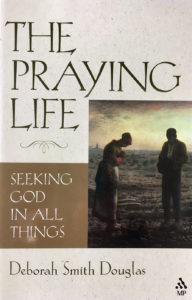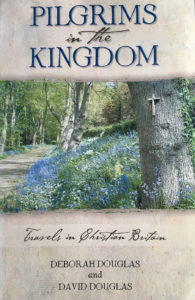Wait and See

Suddenly, silently, without warning, without pain: a great plume of darkness eclipsed the light in my right eye.
The fluid-filled sac of my eye had come unmoored from its sheltering hollow of bone, breaking a vein that poured blood into the eye. The pressure of so much blood in such a small enclosed space then ripped the retina: abruptly that eye could see nothing at all.
Fortunately, excellent medical help was close at hand—a retinal surgeon managed to mend the tear that very night, despite the volume of blood that prevented her from seeing into my eye almost as completely as it prevented me from seeing out of it. She sent me home in the small hours with firm instructions to guard the fragile mended place. For the next month, I was forbidden to drive a car or board a plane. I was not to walk any more than was strictly necessary. No exercise. No stairs. I was not to bend over even to wash my face or tie my shoes. No lifting. No lying down. No writing. Worst of all, for me: no reading. I was to remain upright at all times, rest my eyes, and be still to the point of motionlessness.
All at once, I was not only half-blind, but also immobilized. Captive. My wings clipped, my world made small. Plunged into a landscape of cloud and thick darkness. Disoriented both outwardly—I had never appreciated before how we need both eyes for depth perception, peripheral vision, balance—and inwardly: I, who have always cherished my independence and been impatiently quick of thought, word, and deed, now rendered helpless, held hostage in darkness by a tiny invisible wound and a half-teaspoon of blood.
I knew, even as my little boat rocked wildly in that sudden squall, that my calamity was small: I was hobbled, but hardly paralyzed; I was only half—not wholly—blind. My injury was hardly mortal; the physical pain was negligible. Never at any time was my situation life-threatening: more akin to a fall down stairs than a train wreck.
Nonetheless, the shock was real. There was a steep learning curve to every minute of those first few days—I had to discover how to sleep sitting up, how to do without the limitless reading that has been as indispensable to me as breathing since I was a child, and give up the brisk daily walks that seemed essential to my well-being. How to let other people help me do what I was totally accustomed to doing for myself, from shopping and driving to sorting the mail. The sudden braking of every tempo of my life nearly gave me whiplash.
Those first few turbulent days swept all my plans for work and travel, all my normal rhythms, completely overboard. At first all I wanted—and I wanted it badly, I wanted it now—was to get all that back. I wanted recovery of sight—full unclouded sight in both eyes. I wanted restored clarity of purpose—a return to self-confident quickness of step, unthinking freedom of action, the illusion of control. I wanted my old life back.
What I got instead (eventually, gradually, almost imperceptibly) were new ways of seeing and believing—a glimpse of the new life, the new creation, that God promises.
I had no idea, then, that I had been launched on a journey that would profoundly change my life, taking me to wholly new (and at first wholly unwelcome) levels of dependence and trust.
Biblical scholar Walter Brueggemann has discerned a pattern within the Psalms that reflects the dynamic which I discovered for myself in that small season of darkness, and which seems to be foundational in human experience: a movement from a settled orientation (health, contentment, prosperity) through a jarring disorientation (pain, sickness, loss) to a completely new orientation. The Psalms invite us—as will life itself, at some point—into the realization that “loss and gift are held together in a powerful tension.” There is a wholeness to our lives, Brueggemann observes, that can only be found by embracing the “untamed darkness… discontinuity and brokenness” of the sudden surprises that will befall us all: “the loss of control of our lives is the necessary precondition of new life,” a newness of life that is discovered in darkness and “rooted nowhere else.”
 My season of darkness and dependence seemed long, and the promised new life elusive. Every morning for weeks, the moment I awoke, I held my hand before my face and could not see it at all with my right eye. Every week for over a month, I returned to the eye clinic, but until the high tide of blood within my eye had ebbed, the doctor could not see much either—could not even evaluate the success of the retinal surgery. The ophthalmoscopes showed nothing; ultrasound scans seemed to show healing, but without a clear image it was impossible to know for certain.
My season of darkness and dependence seemed long, and the promised new life elusive. Every morning for weeks, the moment I awoke, I held my hand before my face and could not see it at all with my right eye. Every week for over a month, I returned to the eye clinic, but until the high tide of blood within my eye had ebbed, the doctor could not see much either—could not even evaluate the success of the retinal surgery. The ophthalmoscopes showed nothing; ultrasound scans seemed to show healing, but without a clear image it was impossible to know for certain.
We were both compelled to wait in darkness.
I remembered reading somewhere that while snakes are shedding their skins—a necessary but uncomfortable growth process that can take many days, and recurs at intervals throughout their lives—they go blind, and must retreat to a safe place until their new skin forms and they recover their sight.
I prayed to be patient with my own darkness, withdrawal and vulnerability; prayed to be able to make friends with the “cloud of unknowing” as I waited for restoration of sight. “They that wait upon the Lord shall renew their strength,” the prophet Isaiah reminds us. I remembered that the Greek word for wait (μένω ) has rich connotations of abiding, tarrying, resting, being still, standing fast. And indeed—against all odds, contrary to my own temperament—I found rest and strength in those weeks of waiting in darkness.
The Jesuit philosopher John Kavanaugh spent a month in 1975 working at Mother Teresa’s House of the Dying in Calcutta, and pondering his own future, which was unclear to him at the time. He asked Mother Teresa to pray for him, that God might give him clarity. To his surprise, she refused, saying she would pray instead for what he really needed, which was trust. She herself, she added, had never been granted clarity, only trust.
I wanted clarity in my dark midwinter; but what I really needed—and was granted—was trust. Not that some easy light would be given, or a good outcome assured, but that God would be with me in whatever happened.
Despite the overwhelming suddenness of the change in my circumstances—despite and in the very midst of all the upheaval and uncertainty—after assimilating the first shock, I found myself (to my own surprise, and without the slightest striving or deserving) to be, at my core, unaccountably at peace. Unable really to sleep, I found myself remembering hymns I haven’t sung for decades; I would doze in my armchair and rouse knowing I had been hearing “My Shepherd Will Supply My Need” and “All My Hope on God Is Founded” in my mind. Unable to read, I found myself praying at a new depth—spontaneous prayers of gratitude and trust, not frantic petition or angry reproach. Isolated in many ways, I was almost overwhelmingly aware of the presence of God.
I had indeed been plunged into “cloud and thick darkness”—and like the people of God in every generation I discovered that that is where God dwells.
I was learning, like a snake growing a new skin, to wait blind.
In the words of Pierre Teilhard de Chardin, I was beginning to “trust the slow work of God.” A French Jesuit priest, Teilhard volunteered as a medic throughout World War I. From the trenches he wrote wise and cheerful letters to his childhood companion and cousin Marguerite, who was struggling with the uncertainties of war-torn France on the home front.
“Above all,” he advised her, “trust in the slow work of God. We are quite naturally impatient in everything to reach the end without delay. We should like to skip the intermediate stages. We are impatient of being on the way to something unknown, something new. And yet it is the law of all progress that it is made by passing through some stages of instability—and that it may take a very long time. …Give Our Lord the benefit of believing that his hand is leading you, and accept the anxiety of feeling yourself in suspense and incomplete.”
Slowly, the darkness in my eye began to clear. One morning I could see my hand in front of my face. Another morning I could see, although as through fog, across the street. The cloud of blood was still there, but lifting.
Eventually enough of the blood within the vitreous sac of my eye had been reabsorbed to allow the retinal specialist to see that the tear had mended well. She immediately recommended surgery to clear the rest of the (considerable) mass of blood and debris from the eye. Briskly she outlined the risks inherent in any eye surgery, urged me to schedule the procedure with her receptionist on my way out, closed my file, and stood up to leave the examining room.
But “what would happen,” I asked, “if I just waited instead? Would the rest of the blood be reabsorbed in time?”
“Perhaps,” she shrugged impatiently. “But why wait?”
I think that without the involuntary contemplative practice of those intervening weeks, I might have had no answer to that rhetorical question. But grace had brought me safe thus far: I had somehow learned to be at home in the darkness. I was not as impatient as I once would have been to “reach the end without delay.”
I realized that I, who had always rushed my fences, always been annoyed by waiting of any kind, was now (to my own surprise) willing to wait and see. I was willing to “accept the anxiety of feeling myself in suspense and incomplete.” I was apparently, in spite of a lifetime of being impatient at being on the way to something new, learning to trust that slow work of God.
So I declined the surgical intervention, even though the surgeon warned me that I might not have another chance for it: I would no longer be a candidate for surgery if the vitreous fluid did indeed continue to clear, even slightly, on its own. It was a risk I was glad to take.
That was nearly a year ago. Since then, the capillaries at the back of my eye have continued to ferry away the remaining blood and debris. The vision in both my eyes is (with the strong corrective prescription I have required for years) 20/20: nearly perfect acuity. It is however, as the doctor puts it, a “hazy” 20/20—stubborn wisps of residual cloud still float between me and the world. These may or may not disappear in time: no one seems to know.
It is possible that for the rest of my life the vision in that eye will be clouded. It is possible that it will get worse. And of course it is practically certain that other unforeseen, sudden disorientations—even catastrophes—will occur throughout my life.
However, I am grateful for many mercies, for the slow healing work of God and—above all—the sure promise of God-with-me in darkness and in light.
As for the rest, I am content to wait and see.

